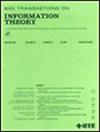有限和连续变量量子系统中的速率限制量子到经典的最优传输
IF 2.2
3区 计算机科学
Q3 COMPUTER SCIENCE, INFORMATION SYSTEMS
引用次数: 0
摘要
我们从输出受限速率失真编码的角度考虑了速率受限量子到经典的最优传输,适用于有限经典通用随机性的有限维量子到经典系统和连续可变量子到经典系统。主编码定理为有损量子测量源编码的可实现速率区域提供了一个单字母表征,以精确构建目的分布(或等效量子态),同时根据一般定义的失真观测值保持源态的失真阈值。输出空间的约束条件将输出分布固定为 IID 预定义的概率质量函数。因此,这个问题也可以看作是信息受限的最优传输问题,即通过有限通信速率和普通随机性的量子测量,找到将源量子态传输到目的经典分布的最优成本。我们通过使用剪切投影和去量化块,并利用我们的有限维编码定理,建立了连续可变量子系统的编码框架。此外,对于高斯量子系统,我们推导出了阶数为 2 的速率受限瓦瑟斯坦距离的解析解,以及高斯最优定理,表明高斯测量优化了具有高斯量子源和高斯目的地分布的系统的速率。结果进一步表明,与经典高斯分布的瓦瑟斯坦距离对应无限传输速率不同,在量子高斯测量系统中,由于海森堡不确定性原理施加的量子测量固有噪声,最佳传输速率是以有限传输速率实现的。本文章由计算机程序翻译,如有差异,请以英文原文为准。
Rate-Limited Quantum-to-Classical Optimal Transport in Finite and Continuous-Variable Quantum Systems
We consider the rate-limited quantum-to-classical optimal transport in terms of output-constrained rate-distortion coding for both finite-dimensional and continuous-variable quantum-to-classical systems with limited classical common randomness. The main coding theorem provides a single-letter characterization of the achievable rate region of a lossy quantum measurement source coding for an exact construction of the destination distribution (or the equivalent quantum state) while maintaining a threshold of distortion from the source state according to a generally defined distortion observable. The constraint on the output space fixes the output distribution to an IID predefined probability mass function. Therefore, this problem can also be viewed as information-constrained optimal transport which finds the optimal cost of transporting the source quantum state to the destination classical distribution via a quantum measurement with limited communication rate and common randomness. We develop a coding framework for continuous-variable quantum systems by employing a clipping projection and a dequantization block and using our finite-dimensional coding theorem. Moreover, for the Gaussian quantum systems, we derive an analytical solution for rate-limited Wasserstein distance of order 2, along with a Gaussian optimality theorem, showing that Gaussian measurement optimizes the rate in a system with Gaussian quantum source and Gaussian destination distribution. The results further show that in contrast to the classical Wasserstein distance of Gaussian distributions, which corresponds to an infinite transmission rate, in the Quantum Gaussian measurement system, the optimal transport is achieved with a finite transmission rate due to the inherent noise of the quantum measurement imposed by Heisenberg’s uncertainty principle.
求助全文
通过发布文献求助,成功后即可免费获取论文全文。
去求助
来源期刊

IEEE Transactions on Information Theory
工程技术-工程:电子与电气
CiteScore
5.70
自引率
20.00%
发文量
514
审稿时长
12 months
期刊介绍:
The IEEE Transactions on Information Theory is a journal that publishes theoretical and experimental papers concerned with the transmission, processing, and utilization of information. The boundaries of acceptable subject matter are intentionally not sharply delimited. Rather, it is hoped that as the focus of research activity changes, a flexible policy will permit this Transactions to follow suit. Current appropriate topics are best reflected by recent Tables of Contents; they are summarized in the titles of editorial areas that appear on the inside front cover.
 求助内容:
求助内容: 应助结果提醒方式:
应助结果提醒方式:


